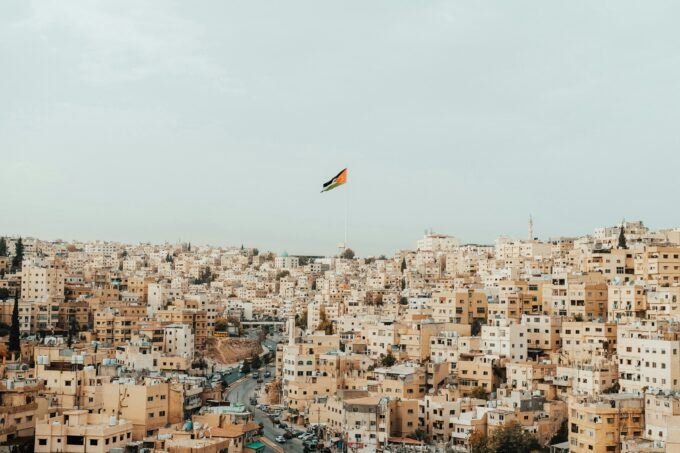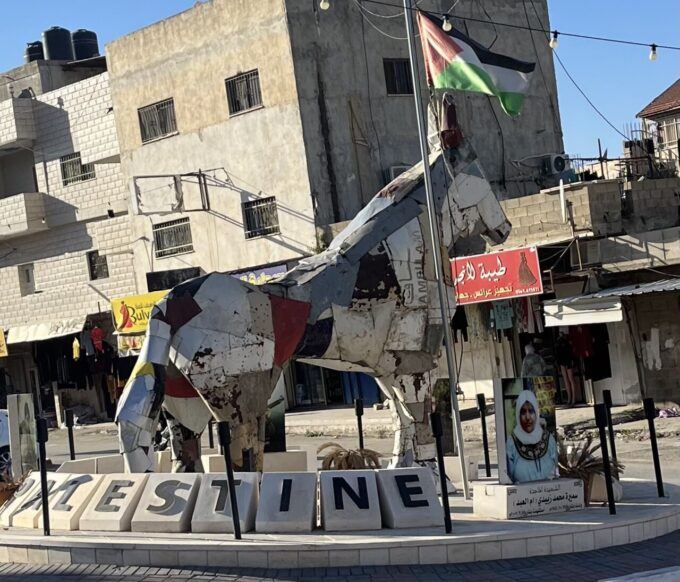Letters from Gaza – ‘Alhamdulillah. We Are Not Okay’

Image by Cristina Gottardi.
Over the past 14 months, I have received hundreds of messages from family members throughout the Gaza Strip. The nature of the messages often conveyed a sense of urgency and panic but, at times, contentment in God’s will.
Some of those who wrote these notes have been killed in Israeli strikes, like my sister, Dr. Soma Baroud; others lost children, siblings, cousins, neighbors and friends. It may seem strange that none of those who communicated with me throughout the war have ever questioned their faith, and have often, if not always, begun their messages by checking on me, and my children.
The samples of the messages below have been edited for length and clarity.
Ibrahim:
“How are you? We are all fine. We had to leave Shati (refugee camp). The Israelis arrived at the camp yesterday. Our whole neighborhood has been destroyed. Our home, too, was destroyed. Alhamdulillah – praise be to God.”
Soma:
“How are you? And how are the kids? Times like these make me realize that no material wealth matters. Only the love of one’s family and community matters most. We had to flee Qarara (east of Khan Yunis, in southern Gaza); the boys fled further south, and I am in Deir Al-Balah with my daughter and grandson. I don’t know what happened to H (her husband). The army bulldozers began destroying the neighborhood while we were still inside. We ran away in the middle of the night.”
A’esha:
“E (her husband) was killed on the first day of the invasion. A (her son) disappeared after he learned that his father was killed. He said he wanted to avenge his father. I am worried. I don’t know what to do.”
Salwa:
“Cousin, A’esha’s son, A, was killed (he was 19). He was fighting in Jabaliya. She is somewhere in Rafah with her surviving kids. Her newborn has a congenital heart defect. Do you know of any charity that can help her? She lives in a tent without food or water.”
Ibrahim:
“We escaped to Al-Shifa (hospital in Gaza City). Then, the Israelis invaded. They took all the men outside and had us stand in line. They spared me. I don’t know why. All the men were executed. Nasser’s son (his nephew) was killed in front of me. We are still trapped at Al-Shifa.”
Soma:
“My husband was killed, brother. That poor soul had no chance. His illness had prevented him from running away on time. Someone says he saw his body after he was shot by a drone. He was hit in the head. But when we went back to the place, we couldn’t find him. There was a massive heap of rubble and garbage. We dug and dug day and night, to no avail. I just want to give him a proper burial.”
A’esha:
“Did Salwa message you about the charity? My baby is dying. I named her Wafa’ after her auntie (26, who was killed in the first few weeks of the war along with her son Zaid, 5 and husband, Mohammed in Gaza City). She can barely breathe. Some people are allowed to leave Gaza through Rafah. They say the UAE accepts some of the wounded and sick. Please help me.”
Walid:
“Have you heard anything about the ceasefire? We ran away back to the center of Gaza, after we were forced to flee south. They (the Israeli army) said ‘Go to the safe zones.’ Then, they killed the displaced inside their tents. I saw my neighbors burning alive. I am too old (he is 75). Please tell me that the war is about to end.”
Ibrahim:
“How are you, cousin? I just wanted to tell you that Nasser (his brother) was killed. He was standing in line waiting for a loaf of bread in Zeitoun. After the martyrdom of his sons, he became responsible for the grandchildren as well. They (the Israelis) bombed the crowd as they waited for the aid trucks. The explosion severed his arm. He bled to death.”
Soma:
“I was in Nuseirat when the massacre happened. (278 people were killed and over 800 wounded on June 8). I walked through the area not knowing the extent of the bloodbath. I was on my way back to Qarara to check on the kids. Bodies were strewn everywhere. They were mostly mutilated, though some were still groaning, desperately grasping onto life. I wanted to help, but I could do nothing. I kept walking from one body to the next, holding hands and looking into dying eyes. I worked in the emergency room for many years. But at that moment I felt helpless. I felt that I, too, had died on that day.”
(Dr. Soma was killed in an Israeli strike targeting her car on October 9. She had just left the hospital, where she worked, to check on her sons.)
Ibrahim:
“My condolences, cousin, for the martyrdom of your sister. She will always remain the pride of our family.”
A’esha:
“Wafa’ died this morning in our tent in Al-Musawi. There was no medicine. No food. No milk. My only solace is that she is now an angel in Paradise.”
Walid:
“How are you, cousin? We are okay. We lost everything, but we are still standing. Alhamdulillah. Do you know when the war will be over? Maybe another week, or two? I am just too old, and so, so tired.”
Fighting Israel’s War in Jenin: Can the Palestinian Authority Be Saved?

The Jenin Horse sculpture in Jenin, Palestine. Photograph Source: Dan Palraz – CC BY-SA 4.0
The latest news from the Palestinian Authority’s (PA) so-called “Protecting the Homeland” operation in the Jenin refugee camp paints a grim picture. Nine Palestinian lives have been claimed in this ongoing crackdown which began on December 5, including a young journalist, Shaza Al-Sabbagh.
The assault, as reported by the Israeli newspaper Haaretz, has, expectedly, received a stamp of approval from the Israeli occupation army, which seems content with the PA’s performance. Meanwhile, Israel’s Channel 14 confirmed that Israel has issued a clear deadline to the PA to finish the task—effectively eradicating what remains of resistance in Jenin, in the name of ending lawlessness and apprehending outlaws.
It is an irony that has become all too familiar: the Palestinian entity that was supposed to represent the will of the people and lead them toward freedom has become complicit in crushing resistance in one of the most marginalized and impoverished areas of the West Bank, all while serving the interests of Israel. This is the heart of the Palestinian paradox in the West Bank.
For years, the PA has demanded unflinching obedience from the Palestinian people in the name of preparing Palestine for sovereignty and statehood. Yet, as the years have passed, this pledge has slipped further and further away. In its place, the PA has become complicit in the expansion of Israel’s territorial control and the erosion of Palestinian rights. This might be a difficult conclusion to digest, but the killing of innocent Palestinians in Jenin at the hands of Palestinian security forces, while Israel and its settlers are cracking down on Palestinians elsewhere in the West Bank, should be all the proof needed to support the above claim.
Moreover, the PA’s strategy of appeasing Israel through ‘security coordination’ has done little to hinder Israel’s systematic land grab and the continued construction of illegal settlements. To the contrary, such ‘coordination’ has emboldened Israel and its unruly settlers.
What is perhaps more damning is the fact that the PA has often become an active participant in the Israeli oppression of Palestinians, as is the case in Jenin today. In its role as an enforcer of Israeli policies, the PA has become a tool of the Israeli occupation, tasked with quelling political dissent and silencing critics.
The latest operation in Jenin is a clear manifestation of how Israel uses the PA to carry out its dirty work. The Jenin refugee camp, an area of less than half a square kilometer, has always been a symbol of Palestinian resistance. According to the Palestinian Ministry of Health, Israel has raided Jenin 80 times in the last year alone, killing over 220 Palestinians and wounding hundreds more. Yet, Jenin remained unbowed. To now see the PA working in concert with the Israeli army to break the will of Jenin’s 23,000 inhabitants is a deeply painful reality for most Palestinians.
What complicates this crisis even further is the silence of many Palestinian intellectuals, both in the West Bank and the diaspora, who have failed to confront the PA with the same vigor with which they criticize the Israeli occupation. But why have so many prominent voices, intellectuals, and political analysts remained mute on the issue of the PA’s betrayal of the Palestinian struggle?
The answer lies in a complex mixture of fear, political pragmatism and historical inertia. For decades, the PA has maintained a stranglehold on the political landscape of Palestinian life. It controls the levers of power, and anyone who dares to challenge its authority risks being silenced—through arrests, imprisonment, or even torture. Palestinian intellectuals, particularly those in the West Bank, are all too aware of this reality.
Additionally, there is a deep sense of paralysis within the Palestinian intellectual community in the occupied West Bank, in part due to their leadership’s failure to confront Israel over the ongoing genocide in Gaza. But there is more to this ongoing paralysis.
For years, the PA has framed itself as the ‘sole legitimate representative’ of the Palestinian people. Many intellectuals who would normally criticize Israel’s occupation are unwilling to take on the PA for fear of further fragmenting the Palestinians. There is a deep-seated belief among some that a public confrontation with the PA would lead to greater disunity, which could play into Israel’s hands.
But this political pragmatism comes at a heavy cost. While many Palestinian intellectuals hesitate to criticize the PA, they are forced into a position of complicity with its actions. The PA’s betrayal of the Palestinian cause is no longer a matter of debate—it is a fact. Yet, by failing to confront this betrayal head-on, intellectuals and activists alike risk forfeiting their moral credibility.
In the face of Israel’s genocidal war on Gaza and unprecedentedly violent crackdowns on Palestinians in the West Bank, the betrayal of the PA has been laid bare for all to see. The PA’s willingness to assist in the subjugation of Palestinians in the West Bank, while pretending to represent them, has exposed the institution like never before.
But can the PA itself be saved? The answer may not even matter. What matters is whether the Palestinian people, in their collective will and resistance, can liberate themselves from Israel’s settler colonialism and the moral corruption of their self-proclaimed leadership. The events of the coming weeks and months will be decisive.
No comments:
Post a Comment